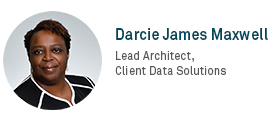Lessons Learned from Fusing the Data and Digital Worlds

Institutional investors have come face-to-face with the stark reality that data is feeding the world. This is the driving factor for companies tackling internal deficiencies in regard to quickly and easily interacting with data to gain actionable insights. How companies mitigate this challenge will have a lasting impact on how technologies such as the cloud, artificial intelligence, and machine learning play a role for businesses and society at large. The importance of maximizing the use of data across a company is an opportunity to fulfill the long-term promise of the aforementioned technologies.
BNY Mellon and Accenture, in discussing a broad range of topics related to the importance of data as part of the ENGAGE20 Virtual event, highlighted how financial services companies currently handle data, the barriers that need to be overcome, and what firms can do to advance their capabilities to create a distinct competitive advantage.
Asset managers and financial institutions can focus on two key areas to help reduce barriers that exist in leveraging data as a true company-wide asset. One way forward for companies to overcome obstacles is to develop an “enterprise mindset” for data, meaning executives should understand how a variety of data benefits the entire organization. Companies also should develop or improve upon their “data foundation.” This means having methods and processes in place to incorporate data across the firm. If these two barriers are not accounted for, data inefficiencies will continue to exist.
How companies organize their data journey is key to solving the more pronounced shortcomings. Companies also should bear in mind that data differs from analytics. One is an engineering discipline (the collection of data), while the other is more of a science in which an abundance of context is needed (analytics).
For more information, view the ENGAGE20 Virtual session.
2020 Macro Themes Revisited: Investing Forever Changed
The below is an excerpt from the BNY Mellon Aerial View article, “2020 Macro Themes Revisited: Investing Forever Changed.”
Back in December, we expected 2020 to be an eventful year, one in which trade negotiations around Phase I would shape inflation and global activity recovery. Eight months on, we find that the spread of COVID-19 has imposed protectionism by brute force. In this reassessment of our 2020 Macro Themes, we revisit the six key market trends we identified in December 2019 as likely to define market activity in 2020, and provide an update on how we expect these forces to play out over the remainder of the year.
For more information, read the BNY Mellon Aerial View article, “2020 Macro Themes Revisited: Investing Forever Changed.”
BNY Mellon Investment Management Podcast: Conversations with Liz Young
BNY Mellon’s latest podcast series: Conversations with Liz Young dives into timely market topics with BNY Mellon thought leaders and industry experts. In episode three: Healthcare and Technology, John Porter, CIO, Head of Equities at BNY Mellon, joins Liz Young, Director of Market Strategy at BNY Mellon Investment Management and CNBC Contributor, to discuss how expansion in telemedicine, artificial intelligence, and preventive health, has been accelerated by COVID-19.
For more information, listen to the podcast, “Conversations with Liz Young: Healthcare and Technology with John Porter.” The podcast is also available on iTunes and Spotify.
Can We Build a Better Economic Future?
The below is an excerpt from the BNY Mellon Investment Management article, “Can We Build a Better Economic Future?”
Whether it be companies working with bad actors across supply chains, poor crisis and contingency preparedness, workforce layoffs, or even brand reputation management, the COVID-19 pandemic has dragged the tide out, exposing businesses and sectors where the Environmental, Social and Governance (ESG) emperor is wearing no clothes. The good news: as the global economy starts to emerge from this worldwide crisis, opportunities will abound for companies across all sectors to recommit to rigorous environmental and social programs and sustainable practices.
For more information, read the BNY Mellon Investment Management article, “Can We Build a Better Economic Future?”
The Income Conundrum
While companies around the world cut, suspend and/or defer dividends, Newton’s head of equity income, Ilga Haubelt states that she remains confident about income investing. In this Q&A session, she and BNY Mellon Investment Management chief economist Shamik Dhar discuss their thoughts on dividend cuts and what implications it could have for the future.
For more information, read the Q&A session on The Income Conundrum.
Investment Industry Association of Canada Newsletter
According to the Investment Industry Association of Canada’s (IIAC) latest newsletter, industry performance during the early COVID-19 period of March through May for which data is most readily available. Furthermore, IIAC states, despite the setback in some areas, the industry overall appears to have weathered the early days of the pandemic well, and the resiliency of the securities industry will be depended on for Canada’s economic recovery.
For more information, including IIAC’s letter to the Investment Industry Regulatory Authority of Canada (IIROC) regarding the proposed regulatory changes resulting from the COVID-19 experience, and other news, read IIAC’s newsletter.


